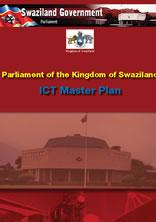Parliament of the Kingdom of Swaziland - ICT Master Plan

The role of Information and Communication Technologies (ICTs) has been acknowledged as important in facilitating the attainment of developmental goals in all sectors of the economy. This was recognized by the United Nations Economic Commission for Africa (ECA) in May 1996 when African Information Society Initiative (AISI) was launched by the Conference of Ministers in charge of social and economic development and planning as an action framework of information and communication activities in Africa. AISI was thus a common vision for bridging the digital divide between Africa and the rest of the world and for establishing effective digital opportunities to be developed by Africans and their partners, and to speed the continent’s entry into the information and knowledge global economy.
South African Development Community Parliamentary Forum (SADC-PF) also identified ICT as a cross-cutting topic in most areas dealt with by Parliamentarians and thus gave Parliaments a significant role in the development, monitoring and evaluation and mobilization of financial resources for national ICT strategies. This assessment of the importance of ICT in Parliaments followed ICT surveys undertaken by SADC-PF in 2001 and 2002 which indicated that adoption of ICT for national Parliaments was undertaken on an ad hoc basis, rendering Parliaments incomparable in development, skills, knowledge and awareness, therefore defeating the purpose of building a knowledge economy in the region.